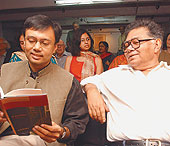 |
| Amit Chaudhuri reads out a passage from his book St Cyril Road and Other Poems to Sunil Gangopadhyay at Oxford Bookstore. Picture by Sanjoy Chattopadhyaya |
Sometimes I feel like giving up writing and opening a second-hand bookshop,? smiled Amit Chaudhuri.
The novelist-singer-poet could probably pull it off, too. The launch of the Calcutta-based author?s latest endeavour ? St Cyril Road and Other Poems ? proved that there are still new shades to discover in Chaudhuri?s creative versatility.
Published by Penguin, the slender volume, launched by Sunil Gangopadhyay at Oxford Bookstore on Friday evening, is a collection of around 20 years of poetry written by Chaudhuri.
Like many writers, his first love was poetry. Chaudhuri described himself as starting out as an ?apprentice poet?, producing ?doggerel verse? that adopted the voices of authors he was reading at the time. Of the ?reams of poetry he produced?, a few were even published, he recalled. On reading DH Lawrence?s Sons and Lovers, Chaudhuri found his own voice. ?I read it as a celebration of marginal, everyday, ordinary existence? I realised that it was possible, through art, to embrace life.?
The everyday, that occupies Chaudhuri?s prose, leaps out of his poetry as well. The title poem, St Cyril Road, Bombay, was written after returning from England. It is the lane in which his house was situated, and is the earliest poem included in the book. It was a time when the ?auditory dimension of life? in India became clear. ?I had moved from the 25th storey to the second storey, from London to St Cyril Road,? he explained. He was awoken, one morning, for the first time, by a bird?s call.
?It is the first thing in which I actually opened out to the non-literary and allowed a locality to enter my work.? This, he said, helped him ?find a voice and come out of apprenticeship?.
Gangopadhyay asked whether love and heartbreak inspired Chaudhuri to pick up the pen, like so many young poets. ?No girl would give me the time of day at all,? replied the writer, with a smile.
The book also includes a translation of Tagore, tilted He is the man of your heart. The song had been a favourite of his and his mother?s, Chaudhuri pointed out.
There are a few poems about world events ? the war in Iraq, conflict in Kashmir ? that seem to have taken the writer himself by surprise.
?I have never written about so much political stuff in my life,? he admitted. But as the ?connections came together? and the subjects became personal, he found the language to ?deal with politics without sacrificing sensuousness?.
Satisfying though verse may be for Chaudhuri (despite the prodigious poetry of his youth having ?dried up? once he started writing prose), the new form readers see now isn?t likely to supplant his established craft.
And neither, we hope, will a second-hand bookstore.
Songs sung true
 |
| Ritika Sahni: Melody and a mission |
She?s been around longer than some of her contemporaries in music, but barring the odd Bollywood playback number or the live performance in the club circuit, Ritika Sahni isn?t seen around much these days.
The Calcutta girl, now based in Mumbai, started her singing career with Chena Shukher Khonje, a Bengali album, in 1997. ?It had some wonderful compositions by Debajyoti Mishra? we were all starting out then,? recalls Ritika.
Another Bengali album, Tomake Ektu, followed five years later, but both, she admits, failed to create the desired impact.
A Hindi pop album happened in 2000, which Ritika feels could have been marketed better. Playback singing for Bollywood continued side by side: from Shyam Benegal?s Hari Bhari to Main Madhuri Dixit Banna Chahti Hoon and a version of the recent Yana Gupta-sizzler Oh! what a babe in Rakht.
But it?s a new project that has got Ritika all excited now, and it encompasses two causes dear to her ? children and the challenged.
In 2002, Ritika released Happy Day, an album of nursery rhymes with help from friend Varsha Seth, a music teacher in Calcutta. What was special about the album was a booklet of lyrics in Braille for the visually challenged. ?The books were difficult and expensive to produce and we did it with our own money, but it was worth it,? says Ritika, who did her B.Ed in deaf education.
Now, Ritika plans a repeat with another volume of rhymes, Tim Tim Tara. Unlike its predecessor, this one has popular English rhymes along with their Hindi versions. Happy birthday to you, Twinkle twinkle, Jack and Jill, Hot cross buns? and lots more. ?But it?s really the Hindi versions we have focussed on, localising them in the process,? she offers.
The team remains the same, with pop singer Parvez Quadir also helping out on some of the tracks. There are plans to have Bengali and Gujarati versions of Tim Tim Tara. ?The Gujarati text is ready and the Bengali lyrics shouldn?t take long,? says Ritika. The only problem is funds. ?There isn?t any money if you want to do something like this for children,? she laments.
That, however, is not stopping her from distributing the Braille booklets of the album. ?We?ll be able to produce around 200 books by June.?
Also in the pipeline is a solo album in Hindi with a ?classical folk? theme. She?s on television too, hosting shows for Bengali channels. And the stage shows continue. ?That?s for the money to be ploughed into projects that I am passionate about,? admits Ritika.










